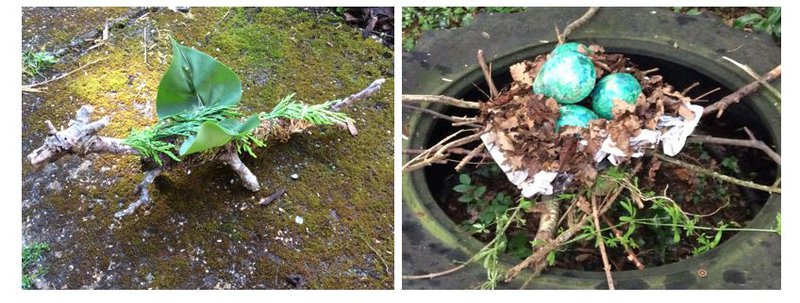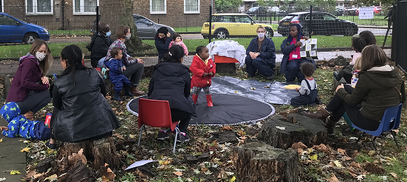Alison Tebbs, Early Years Project Manager at the National Literacy Trust and Level 3 Forest School Leader reflects on the value of outdoor experience in the early years.
Over the past two years of intermittent lockdowns with little opportunity for children to socialise and with research showing disadvantaged families were impacted more by limited access to outdoor space, the way this will have affected children is concerning.
Children, our youngest and most vulnerable children in particular, have missed out on so much. However, as restrictions have been rolled back, now is the time to get out and about with the children and families you support.
Research from T. Gill showed that outdoor learning boosts confidence, social skills, communication, motivation, physical skills, knowledge and understanding, while research from O’Brien and Murray found an increase in children’s self-esteem, self-confidence, ability to work cooperatively and positive attitude to learning following Forest School experience, an inspirational process that offers children, young people and adults regular opportunities to achieve, and develop confidence and self-esteem through hands-on learning experiences in a woodland environment.
We support the current Nature Premium campaign calling for funding for regular nature experiences for every child to boost mental and physical wellbeing after lockdown, as we have seen children and their families benefit greatly from our own outdoor early years work we have been working to develop and provide to early years settings over the past year.
Inspired by my experiences with the Forest School and in light of school and setting closures during the pandemic, I worked with the early years team to adapt our flagship early years programme Early Words Together to create Early Words Together Outdoors, a programme that allows early years settings, particularly in areas of disadvantage, to utilise their outdoor space to help develop language skills, prompted by new and sensory experiences, and give children opportunities they may have missed out on during lockdown.
Reimagining our core Early Words Together programme as an outdoor family learning opportunity has brought back so many happy memories of my time as ‘Mrs Trees’, a Level 3 Forest School Leader in North Hampshire.
I’m really passionate about outdoor learning and here are some of my favourite memories of the Forest School experience.
Over six months, each session began with the group of reception children walking around the Forest School area and noticing the changes week on week. We watched the ice across the small ponds thaw, the leaves and ‘candles’ develop on the horse chestnut trees, the spring flowers grow and nesting begin, the cow parsley blossom, brambles bud and flower to bear blackberries, and the ponds empty of pond life and dry up in the summer heat.
The children became experts at noting and commenting on the change in the seasons. At the end of each session we gathered again and passed around a ‘talking stick’, so everyone, including the adults, had the opportunity to share what they had seen or enjoyed most that week.
I remember the transformation for some children who had struggled with indoor classroom learning, who became natural leaders outside as they designed dens, focused on chosen tasks, organised others, became busy and active, worked and interacted happily together.
Within this safe environment, children were able to explore personal risk, whether that was how high they chose to climb, their proximity to spiders, or even the feel of damp leaves and squelchy mud on their fingertips.
Quieter children gained confidence and found their voice outside. One boy with autism really connected; I can still remember him waving goodbye to me and calling again and again ‘Goodbye Mrs Trees’ on the slow return to the classroom, to the amazement of staff.
During these sessions we played listening games and shared stories with the help of a small finger puppet called ‘Woody’ who, over time (and with the children’s help) learned the dangers of littering for his forest friends and began to respect and care for the natural environment.
Dressed appropriately for the weather we drank hot chocolate, chatted and listened to the rain hammer on the tarpaulin shelter strung up above us between the trees, or listened to the birds sing and the insects buzz around us.
We played, discovered sticky-weed, climbed and hugged trees, made bird food, pond dipped, built bug hotels, made nature collages and mobiles, explored, lit campfires and roasted marshmallows.
One day we found some large shiny eggs and a small, sad, lost dragon arrived. Together we looked after it and helped Woody make and feed the dragon mud soup until it was strong enough to fly home. It was a completely magical time for me and judging by the feedback and comments from staff, children and parents, a really valued experience for them too.

Getting outside, experiencing and exploring the natural environment is essential to child and adult wellbeing and an antidote to the pandemic experience of being separated from nature and from others. Any outdoor space, large or small, a garden, or local park can be used, with wilder, less tidy areas of leaves, weeds, stones and bark providing richer habitat and cover for small animals and insects.
Children communicate differently with freer, louder ‘outside’ voices and are enthusiastic to share and talk about their discoveries. Spending time together outside with children and their families is a valid, positive and helpful experience following lockdowns and it is essential to continue this access for future wellbeing too.
Explore out outdoors resources: EWT Outdoors , Outdoor activities to support communication and wellbeing , Get outside with the Gruffalo, Activities to try outside , Learning outdoors
For further information on Forest School, including Forest School training, or locating a qualified Forest School Leader near to you, please see the Forest School Association website:
